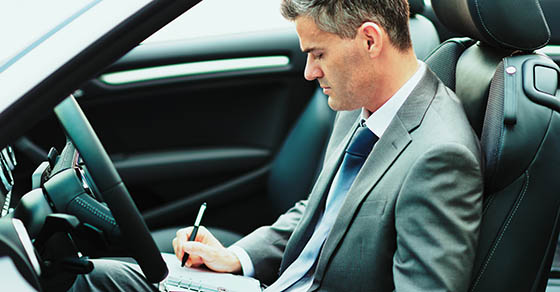Business meal and vehicle expense deductions receive a higher level of scrutiny from the IRS. In some cases, taxpayers are caught recreating supporting documents months or years after they occurred. When doing this, they fail to meet the strict substantiation requirements set forth under tax law.
As illustrated by one recent U.S. Tax Court case, IRS auditors can root out inconsistencies, omissions, and errors in taxpayer records.

Facts of the case
In the case, a married couple claimed $13,596 in car and truck expenses, supported only by mileage logs that weren’t kept contemporaneously and were made using estimates rather than odometer readings. The court disallowed the entire deduction, stating that “subsequently prepared mileage records do not have the same high degree of credibility as those made at or near the time the vehicle was used and supported by documentary evidence.”
The court noted that it appeared the taxpayers attempted to deduct their commuting costs. However, it stated that “expenses a taxpayer incurs traveling between his or her home and place of business generally constitute commuting expenses, which … are nondeductible.”
A taxpayer isn’t relieved of the obligation to substantiate business mileage, even if he or she opts to use the standard mileage rate (65.5 cents per business mile in 2023), rather than keep track of actual expenses.
The court also ruled the couple wasn’t entitled to deduct $5,233 of travel, meal and entertainment expenses because they didn’t meet the strict substantiation requirements of the tax code. (TC Memo 2022-113)
Stay on the right track
This case is an example of why it’s critical to maintain meticulous records to support business expenses for vehicle and meal deductions. Here’s a list of “DOs and DON’Ts” to help meet the strict IRS and tax law substantiation requirements for these items:
DO keep detailed, accurate records. For each expense, record the amount, the time and place, the business purpose, and the business relationship of any person to whom you provided a meal. If you have employees who you reimburse for meals and auto expenses, make sure they’re complying with all the rules.
DON’T reconstruct expense logs at year end or wait until you receive a notice from the IRS. Take a moment to record the details in a log or diary or on a receipt at the time of the event or soon after. Require employees to submit monthly expense reports.
DO respect the fine line between personal and business expenses. Be careful about combining business and pleasure. Your business checking account shouldn’t be used for personal expenses.
DON’T be surprised if the IRS asks you to prove your deductions. Vehicle and meal expenses are a magnet for attention. Be prepared for a challenge.
With organization and guidance from us, your tax records can stand up to inspection from the IRS. There may be ways to substantiate your deductions that you haven’t thought of, and there may be a way to estimate certain deductions (called “the Cohan rule”), if your records are lost due to a fire, theft, flood or other disaster. Contact your Rudler, PSC advisor at 859-331-1717 for more information.
RUDLER, PSC CPAs and Business Advisors
This week's Rudler Review is presented by Drew Sullivan, Senior Accountant and Lisa Dooley, CPA.
If you would like to discuss your particular situation, contact Drew or Lisa at 859-331-1717.


As part of Rudler, PSC's commitment to true proactive client partnerships, we have encouraged our professionals to specialize in their areas of interest, providing clients with specialized knowledge and strategic relationships. Be sure to receive future Rudler Reviews for advice from our experts, sign up today !